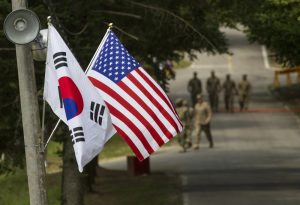For nearly two decades Republican and Democratic administrations in the United States worked to strengthen ties with South Korea, but the Trump administration’s America First agenda reversed some of those gains.
Running on an America First agenda that prioritized maximizing U.S. gains in international relationships, the Trump administration sought to gain concessions in trade and significantly raise Seoul’s contributions to the cost of deploying U.S. troops in South Korea. In 2017, President Donald Trump threatened to withdraw from the U.S.-Korea FTA (KORUS FTA) and ultimately pushed South Korea to renegotiate the agreement. Negotiations over burden sharing for U.S. troops stationed in South Korea have been tense with the United States originally seeking five times what Seoul contributes. With the two sides far apart they have failed to reach an agreement in the current round of talks.
Elections, however, present an opportunity for administrations to adjust policies in a second term or pursue a different course with a new administration.
Whether Trump wins re-election or former Vice President Joe Biden wins on November 3 they will find that Americans are relatively satisfied with relations with South Korea. Based on a recent survey commissioned by the Korea Economic Institute of America, two-thirds of Americans have a very favorable or favorable opinion of South Korea and 49 percent view South Korea as a friend of the United States.
On the issues that have created tension in the relationship in recent years Americans are fairly content as well. Nearly two-thirds of Americans believe that trade with South Korea is in the United States’ interest. Only 9 percent believe that it is not. It is also unlikely that this support is due to the administration’s drive to renegotiate the agreement as only 27 percent of Americans are aware that the United States and South Korea have a free trade agreement.
The issue of burden sharing is also unlikely to be a major concern of Americans. Slightly more than 62 percent of Americans believe the U.S.-South Korea alliance to be in the national security interest of the United States, including 74 percent of Republicans. There are, however, indications that a plurality of Americans would like to see some changes in U.S. alliances more generally.
There have been reports that the United States is considering reducing the current level of troops in South Korea, including that the Trump administration was willing to bring home 4,000 troops if South Korea did not meet its demands that Seoul pay $5 billion in support of U.S. troops in South Korea. Former U.S. Ambassador to Germany Richard Grenell added to concerns about troop reductions when he commented that “We (the Trump administration) want to bring troops from Syria, Afghanistan, Iraq, from South Korea, Japan and from Germany,” and suggested that Americans “are getting a little bit tired of paying too much for the defense of other countries.”
But there seems to be little support for brining troops home from South Korea as 49 percent of Americans believe the United States should maintain its current level of troops in South Korea and 7 percent favor increasing the number of troops. Those numbers rise among Republicans with 56 percent favoring the current level of troops and 9 percent supportive of increasing the number of troops in South Korea. Less than 20 percent of Americans think the United States should reduce or withdrawal its troop presence.
While Americans are largely content with the relationship with South Korea there are also areas of opportunity to deepen cooperation. When asked what issues the United States and South Korea should cooperate on a majority of Americans support the allies working together on peacekeeping, global health, the development of international trade rules, and technology infrastructure.
There is bipartisan support for cooperation on peacekeeping, but cooperation on technology infrastructure could also be promising in light of U.S. efforts to ensure the countries develop secure 5G networks. In addition to Nokia and Ericsson, Samsung is a leading alternative supplier of 5G network equipment. While a relatively small player in network equipment overall, it commands slightly less than 15 percent of the 5G network equipment market and has already laid out a 6G vision. It is also the preferred vendor for 5G in many ASEAN states.
Climate change could also be a potentially promising area for cooperation in light of South Korea’s efforts to develop hydrogen as a fuel source and its own push for a Green New Deal. It also holds promise for regional cooperation with countries such as Australia and Japan that are also promising partners in developing hydrogen as a fuel source. However, there is sharp political divides on climate change. While 59 percent of Democrats support cooperation on climate change, only 16 percent of Republicans do.
While there are some political divisions, these findings suggests the potential basis for a renewed agenda for relations with South Korea. Based on the support for the alliance and the deployment of U.S. troops, quickly resolving the dispute over burden sharing should be a priority. The dispute over cost-sharing distracts from addressing more critical issues related to restructuring the alliance to deal with the changing geopolitical circumstances, the introduction of artificial intelligence into military technology, and changing demographics. But the results also suggest that Americans are supportive of expanding cooperation with South Korea in ways that would strengthen international rules, increase technology cooperation, global health and potentially climate change.































